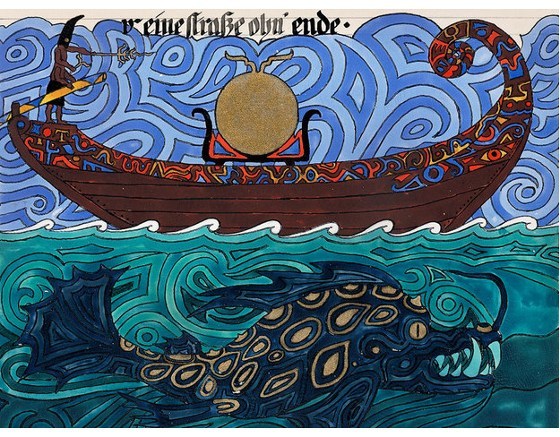Epistola ad Romanos
schema
from: Joseph Fitzmyer, Romans, The Ancor Bible, 33, New York u.a. 1993
Introduction (1:1-15)
1. Adress and Greeting (1:1-7) [* Expositio 1,4]
2. Thanksgiving (1:8-9)
3. Proem: Paul's desire to come to Rome (1:10-15) [* Expositio 1,11]
I. Doctrinal section: God's Gospel of Jesus Christ our Lord (1:16-11:36)
A. Through the Gospel the uprightness of God is revealed as justifying people of faith (1:16-4:25)
4. Theme anounced: The Gospel is the powerful source of salvation for all, disclosing God's Uprightness (1:16-17)
Theme negatively explained: without the Gospel God's wrath is manifested against all human beings (1:18-3:20)
5. God's wrath manifested against pagans (1:18-32) [* Expositio 1,18. 21. 24. 28-29. 32]
God's judgement manifested against jews – indeed, against all human beings (2:1-3:20)
6. Discernment at God's Eschatological judgement (2:1-11) [* Expositio 2,1. 5]
7. The law and its observance (2:12-16) [* Expositio 2,15]
8. Transgression of the law by jews (2:17-24)
9. Circumcision does not make the real jew (2:25-29) [* Expositio 2,29]
10. Objections to this thesis about the jews (3:1-9)
11. All human beings, jews and greeks alike, are sinners (3:10-20) [* Expositio 3,20]
Theme positively explained: God's uprightness is manifested to all sinners through Christ and apprehended by faith (3:21-31)
12. All share without distinction in the justification, redemption, and expiation of Christ Jesus (3:21-26)
13. Polemical Development of this theme (3:27-31) [* Expositio 3,31]
Theme illustrated in the law: Abraham was justified by faith, not by deeds (4:1-25)
14. Abraham justified by faith (4:1-8) [* Expositio 4,2. 4. 5]
15. Abraham justified before he was circumcised (4:9-12)
16. As with Abraham, the promise comes only to the people of faith (4:13-25) [* Expositio 4,15. 17. 20]
B. The love of God further assures salvation to those justified by faith (5:1-8:39)
17. The anounced: justified christians are reconciled to the God of Love; they will be saved through hope of a share in the risen life of Christ (5:1-11) [* Expositio 5,3]
Theme explained: new christian life brings a threefold liberation and is empowered by the Spirit (5:12-8:13)
18. Freedom from the power of death and sin (5:12-21) [* Expositio 5,13. 14. 15-19. 20]
Freedom from self through union with Crhist (6:1-23)
19. Freedom from sin and self through baptism (6:1-11) [* Expositio 6,1-2. 6]
20. Freedom for commitment (6:12-23) [* Expositio 6,14]
Freedom from the law (7:1-25)
21. Freedom from the law by the death of Christ (7:1-6) [* Expositio 7,2]
22. Role of the law in human life (7:7-13) [* Expositio 7,8. 9. 10. 11. 13]
23. Complain and cry of human beings enslaved by the law (7:14-25) [* Expositio 7,14. 15. 16. 23-25]
24. Christian life empowered by the Spirit of God (8:1-13) [* Expositio 8,1. 3-4. 7. 10. 11.]
Theme developed: christian life, lived in freedom bestowed by the indwelling Spirit, has his destiny in glory (8:14-39)
25. Through the Spirit the christian becomes a child of God, destined for Glory (8:14-17) [* Expositio 8,15-16]
26. Three things testify to this new destiny: creation groaning in travail (8:18-23) [* Expositio 8,19-23]
27. The fact of christian hope (8:24-25)
28. Even the Spirit (8:26-27) [* Expositio 8,26-27]
29. The christian called and destined for glory (8:28-30) [* Expositio 8,28-30]
30. Hymn to the love of God made manifest through Christ Jesus (8:31-39) [* Expositio 8,35. 38]
C. This justification and salvation through faith do not contradict God's promises to Israel of old (9:1-11:36)
31. Paul's lament about his former coreligionists (9:1-5) [* Expositio 9,5]
Israel's failure: it is not contrary to God's direction of history (9:6-29)
32. God's promises to Israel stem from his gratuitous election of it as his people; hence his word has not failed (9:6-13) [* Expositio 9,11-13]
33. Gods sovereign freedom even uses indocility to his purpose (9:14-23) [* Expositio 9,14-21. 22]
34. God does not act arbitrarily: Israel's call, infidelity, and remnant are foreseen in what God announced in the Old Testament (9:24-29) [* Expositio 9,24-25. 27]
Israel's failure: it is derived from its own refusal (9:30-10-21)
35. Israel has stumbeld in its pursuit of uprightness (9:30-33)
36. Uprightness comes from faith in Christ, who is the end of the law (10:1-4) [* Expositio 10,1]
37. The new way of uprightness, open to all, is easy and near at hand, as Scripture shows (10:5-13)[* Expositio 10,8-10]
38. Israel has not responded to this preached word (10:14-21) [* Expositio 10,19]
Israel's failure: it is partial and temporary (11:1-36)
39. Israel's hardening is partial (11:1-10) [* Expositio 11,1]
40. Israel's disbelief is temporary and providential (11:11-24) [* Expositio 11,11]
41. The mystery of Israel: it will all be saved (11:25-32)
42. Hymn of praise to God's wisdom and mercy (11:33-36)
II. Hortatory section: the demands of upright life in Christ (12:1-15:13)
A. Spirit guided christian life must be worship paid to God (12:1-13:14)
43. Life in the world as worship of God (12:1-2)
44. Sober existence using God's gifts for all (12:3-8)
45. Counsels for christians living in the community (12:9-21) [* Expositio 12,20]
46. The relation of christians to civil authorities (13:1-7) [* Expositio 13,1. 3. 4. 5]
47. The debt of love that fulfills the law (13:8-10) [* Expositio 13,8. 10]
48. Eschatological exhortation: christian life as vigilant conduct (13:11-14) [* Expositio 13,11. 14]
B. The duty of love owed by the strong in the community to the weak (14:1-15:13)
49. Christian solidarity: its extent and its limits (14:1-12) [* Expositio 14,1-3. 4. 5.]
50. The marks of Christ's rule in the community (14:13-23) [* Expositio 14,22]
51. Christ is our model in all conduct (15:1-6)
52. Welcome all who turn to Christ as Lord, jew and gentile (15:7-13) [* Expositio 15,8-9]
III. Paul's plans, coming task, and request for prayers (15:14-33) [* Expositio 15,16]
53. Paul's missionary principle in his work so far; his desire to visit the romans en route to Spain (15:14-24)
54. His coming task before that visit: to carry a collection to the poor of Jerusalem (15:25-29)
55. Paul's request for prayers that his mission to Jerusalem may succed; his concluding blessing (15:30-33)
IV. Conclusion: letter of recommendation for Phoebe and greetings to roman christians (16:1-2)
56. Paul recommends Phoebe, a minister of Cenchreae (16:1-2)
57. Paul greetings to various persons (16:3-16)
58. Paul's admonition about false teachers; his concluding blessing (16:17-20) [* Expositio 16,17. 18]
59. Greetings from Paul's companions and the scribe Tertius (16:21-23)
V. Doxology (16:25-27)
60. Glory to God of wisdom through Jesus Christ (16:25-27)






